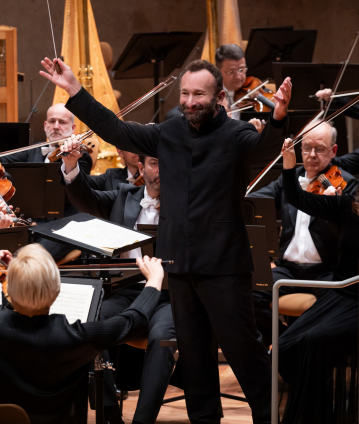Kirill Petrenko conducts Mozart, Berg and Brahms

Kirill Petrenko traverses the German-Austrian musical tradition with works that repeatedly look into abysses. Mozart’s Symphony No. 29 fascinates with a combination of light-heartedness and subliminal despair; in Berg’s Three Pieces for Orchestra, echoes of waltzes and marches are nightmarishly distorted. Brahms’s Fourth Symphony is one of the most magnificent works of the late Romantic repertoire and is pervaded with touching melancholy.
Here, the Berliner Philharmoniker under the baton of their chief conductor Kirill Petrenko pursue the programme concept from the 2022/23 season of Johannes Brahms as a bridge between the First and Second Viennese Schools. While last season Kirill Petrenko placed works by Beethoven and Schoenberg alongside Brahms’s Variations on a Theme by Joseph Haydn, now the Fourth Symphony follows Wolfgang Amadeus Mozart’s Symphony No. 29 and Alban Berg’s Three Pieces for Orchestra.
The focus on Brahms is just as firmly anchored in the orchestra’s history as its engagement with Viennese Modernism: both Arnold Schoenberg’s Orchestra Variations, conducted by Kirill Petrenko in January 2023, and Berg’s Three Pieces for Orchestra were premiered by the Berliner Philharmoniker. (However, Anton Webern only conducted the first two of the three pieces in 1923). Berg dedicated them to his friend and teacher Schoenberg “in immeasurable gratitude and love”. But he was not the sole inspiration for the sumptuously scored work: in the march especially, Berg audibly pays homage to Gustav Mahler.
But what makes Brahms the link between the eras? In short, you could say the emancipation of the motif. While Classical symphonies usually treat themes in their entirety, Brahms’s themes are designed to be deconstructed in the best sense – an upbeat, a sequence of intervals, a change of harmony provide him with germ cells for constantly new thoughts and connections. This kind of micro-level variation opened up entirely new possibilities for music development. Brahms perfected this approach – and masterfully combined it in his Fourth Symphony with emotional urgency.
© 2023 Berlin Phil Media GmbH
Related interviews
Artists
Our recommendations
- Kirill Petrenko with Puccini’s “Madama Butterfly”
- Inaugural concert: Kirill Petrenko conducts Beethoven’s Ninth Symphony
- Kirill Petrenko with Strauss’s “Die Frau ohne Schatten” in Baden-Baden
- Season opening 2018: Kirill Petrenko conducts Beethoven and Strauss
- Kirill Petrenko conducts Beethoven’s Ninth Symphony at the Brandenburg Gate
- Kirill Petrenko conducts Tchaikovsky’s “Mazeppa”